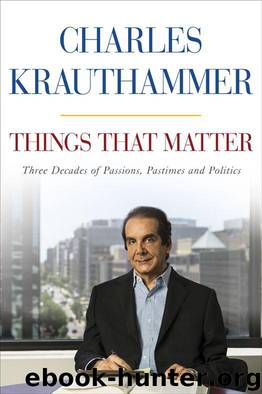Things That Matter by Charles Krauthammer

Author:Charles Krauthammer [Charles Krauthammer]
Language: eng
Format: epub
ISBN: 9780385349185
Publisher: Crown Publishing Group
Published: 2014-03-14T16:00:00+00:00
ESSAY: ON THE ETHICS OF EMBRYONIC RESEARCH
THE PROBLEM
You were once a single cell. Every one of the 100 trillion cells in your body today is a direct descendant of that zygote, the primordial cell formed by the union of mother’s egg and father’s sperm. Each one is genetically identical (allowing for copying errors and environmental damage along the way) to that cell. Therefore, if we scraped a cell from, say, the inner lining of your cheek, its DNA would be the same DNA that, years ago in the original zygote, contained the entire plan for creating you and every part of you.
Here is the mystery: Why can the zygote, as it multiplies, produce every different kind of cell in the body—kidney, liver, brain, skin—while the skin cell is destined, however many times it multiplies, to remain skin forever? As the embryo matures, cells become specialized and lose their flexibility and plasticity. Once an adult cell has specialized—differentiated, in scientific lingo—it is stuck forever in that specialty. Skin is skin; kidney is kidney.
Understanding that mystery holds the keys to the kingdom. The Holy Grail of modern biology is regenerative medicine. If we can figure out how to make a specialized adult cell dedifferentiate—unspecialize, i.e., revert way back to the embryonic stage, perhaps even to the original zygotic stage—and then grow it like an embryo under controlled circumstances, we could reproduce for you every kind of tissue or organ you might need. We could create a storehouse of repair parts for your body. And, if we let that dedifferentiated cell develop completely in a woman’s uterus, we will have created a copy of you—your clone.
That is the promise and the menace of cloning. It has already been done in sheep, mice, goats, pigs, cows, and now cats and rabbits (though cloning rabbits seems an exercise in biological redundancy). There is no reason in principle why it cannot be done in humans. The question is: Should it be done?
Notice that the cloning question is really two questions: (1) May we grow that dedifferentiated cell all the way into a cloned baby, a copy of you? That is called reproductive cloning. And (2) may we grow that dedifferentiated cell just into the embryonic stage and then mine it for parts, such as stem cells? That is called research cloning.
Reproductive cloning is universally abhorred. In July 2001 the House of Representatives, a fairly good representative of the American people, took up the issue and not a single member defended reproductive cloning. Research cloning, however, is the hard one. Some members were prepared to permit the cloning of the human embryo in order to study and use its component parts, with the proviso that the embryo be destroyed before it grows into a fetus or child. They were a minority, however. Their amendment banning baby-making but permitting research cloning was defeated by 76 votes. On July 31, 2001, a bill outlawing all cloning passed the House decisively.
Within weeks, perhaps days, the Senate will vote on essentially the same alternatives.
Download
This site does not store any files on its server. We only index and link to content provided by other sites. Please contact the content providers to delete copyright contents if any and email us, we'll remove relevant links or contents immediately.
The Secret History by Donna Tartt(16682)
The Social Justice Warrior Handbook by Lisa De Pasquale(11497)
Thirteen Reasons Why by Jay Asher(7810)
This Is How You Lose Her by Junot Diaz(5806)
Weapons of Math Destruction by Cathy O'Neil(5058)
Zero to One by Peter Thiel(4841)
The Myth of the Strong Leader by Archie Brown(4797)
Promise Me, Dad by Joe Biden(4463)
Beartown by Fredrik Backman(4447)
How Democracies Die by Steven Levitsky & Daniel Ziblatt(4431)
Stone's Rules by Roger Stone(4427)
The Fire Next Time by James Baldwin(4357)
100 Deadly Skills by Clint Emerson(4095)
A Higher Loyalty: Truth, Lies, and Leadership by James Comey(4045)
Rise and Kill First by Ronen Bergman(4029)
The David Icke Guide to the Global Conspiracy (and how to end it) by David Icke(3900)
The Farm by Tom Rob Smith(3884)
Secrecy World by Jake Bernstein(3793)
The Doomsday Machine by Daniel Ellsberg(3743)
